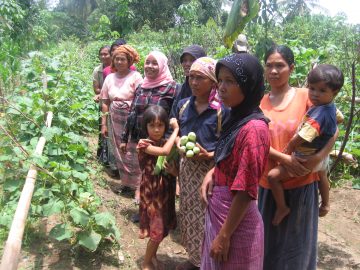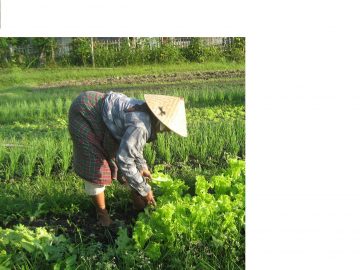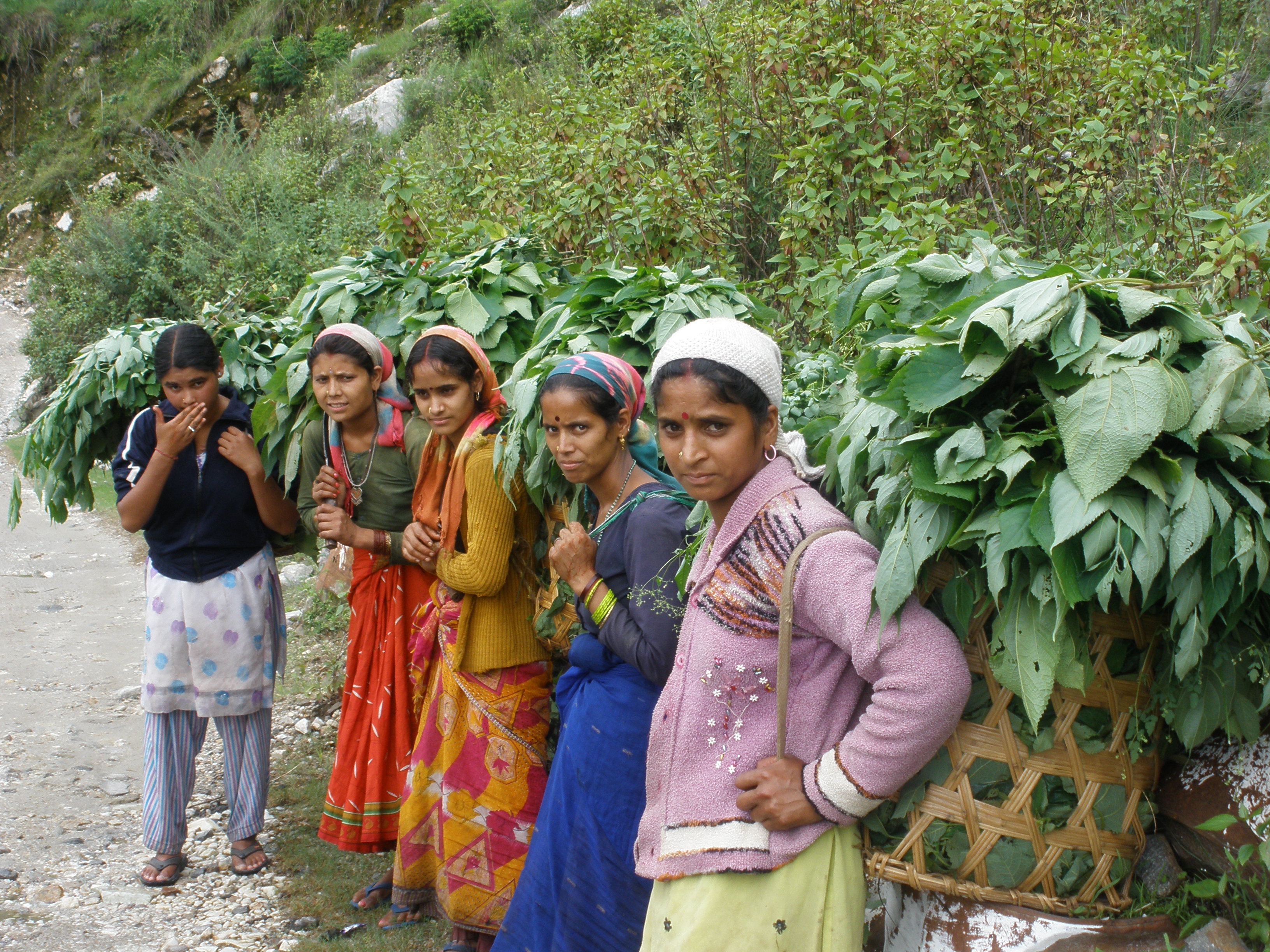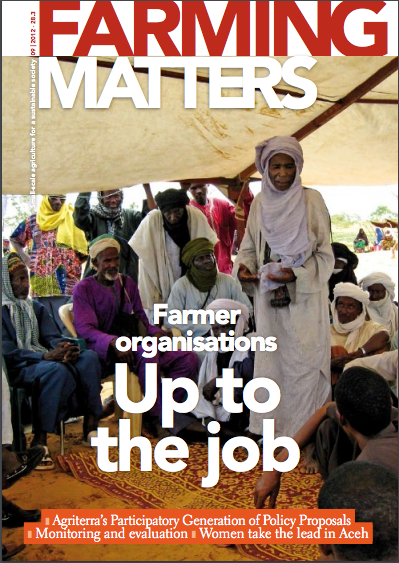In 2004 the province of Aceh in Indonesia was affected by a devastating earthquake and tsunami. The impact on rural communities was particularly harsh, exacerbating the existing poverty and poor living conditions caused by a long separatist conflict. A network of women farmers established under these difficult circumstances is not only benefitting its participants, but also their families and communities.
The Australian Centre for International Agricultural Research (ACIAR) was one of many organisations which became involved in regenerating agriculture in Aceh in the wake of the tsunami. Although we were well aware that many post-disaster development programmes are criticised for having a limited impact, we wanted to support rural communities stru

ggling to recover from the loss of life, displacement and breakdown of community networks. Our projects were research-centred, seeking solutions to the soil and crop problems farmers faced after the tsunami.
Our early consultations and forums were predominantly attended by male farmers and government staff. A chance meeting with Ibu Supriyani, an inspirational extension agent working on the tsunami-devastated west coast of Aceh with Penyuluh Petani Lapang, the local extension organisation, showed us the importance of providing direct assistance to women farmers. As elsewhere in Indonesia, women in rural Aceh are highly dependent on farming for their livelihoods, but we could not see many programmes supporting them.
Small benefits add up
Supriyani had established organic agriculture groups made up of women farmers, working to provide an occupation for women who had no work in the tsunami-damaged rice fields and limited opportunities elsewhere. With limited funds, the participants were making their own fertiliser from fish waste and manure, and growing crops on vacant plots. The women’s engagement and enjoyment of working together to produce food for home and sale, and their interest in learning new skills, inspired us to include seed money for women’s farming activities in a new project. The funds helped Supriyani provide training, establish new groups and meet the growing demand to participate in the programme.
The initial financial support provided to the groups was small, but by focusing on leadership and capacity building, the benefits endure, as groups establish a solid basis for the future. Growing fresh food locally saves money, which can then be invested in, for example, education. Fresh organic crops now form a greater part of the diets of these families, improving their general health. Training and capacity building has helped diversify the local food production options, creating more independent and sustainable communities. Some groups have taken their development further, identifying business opportunities to supply fresh and processed products to local and regional markets. All this happens without disrupting family activities in the rice fields and rubber plantations.
Bringing women together, the start of a network?
It was not long before we met other extension staff working with groups of women farmers, so we decided to bring them all together in a forum to identify which activities should be supported. The discussions and recommendations from this !rst forum, which was held in Aceh in 2009, helped us design a training programme for women. This programme was built on Supriyani’s model of group management; the group members’ commitment, the management of pro!ts, and also on an organic approach to farming vegetables. This provided other extension staff with a guideline to establish new groups.
In 2009, Balai Pengkajian Teknologi Pertanian (BPTP), the provincial agricultural service, appointed Ibu Nazariah as co-ordinator of the women’s farming groups, with the specific responsibility of establishing and managing the programme. Since then, Nazariah has been assisted by volunteers from the Australian Youth Ambassadors for Development programme, and by an increasing number of local extension staff who provide the day to day support to the groups. In 3 years, the total number of participants has grown from 60 to more than 700 women. The programme’s credibility is reinforced by its training and communication activities and by regular interactions with the local staff. Some groups are now financially independent and act as hubs for the demonstration and dissemination of new ideas.
The most interesting observation, however, is that the programme has evolved into a network of women farmers and advisory staff, who maintain contact through exchange visits and farmer forums. Attending a meeting in July 2011, farmers and representatives of both the government and a group of NGOs that support or work with women discussed the establishment of a Women in Agriculture Network in Aceh, following similar examples in Australia and Papua New Guinea. We agreed on the goals and structure of the proposed network and started working to formally establish it.
From isolation to leadership
Immediately after the tsunami, the focus of most programmes was on soil rehabilitation and agricultural recovery. Working in the more accessible parts of Aceh we rare

Photos: BPTP Aceh Barat
ly saw the impacts of the civil conflict that has lasted nearly 30 years. While the impact on infrastructure has been reported, the social and psychological impacts are rarely mentioned. Visiting some women’s farming groups in the more isolated parts of Aceh, we began to understand the conflict’s wider impact.
Social isolation and limited access to social services are some of the lasting effects of the conflict in Aceh. Rural networks were affected by the loss of life and displacement, and in some cases farming ceased altogether because of the difficulties and danger of working in the fields. In many rural villages access to technical assistance and resources such as seed remains difficult.
Comprehensive strategies to develop community-based programmes are crucial to meeting the challenges of the estimated 600,000 people displaced by the conflict. The women farmers programme meets some of the needs of local communities, providing income generating activities and promoting communication and co-operation within and between villages.
Whilst not all groups in the women farmers programme are situated in areas that were affected by the conflict, the social contribution of our communication and co-operation efforts is recognised as the main benefit by the Aceh women. The group farming activities provide a focus for social interaction, which is often missing in the villages. In former conflict zones women spoke of years of remaining isolated in their homes, only leaving when it was deemed safe to work in the rice fields. Coming together as a group has provided a renewal of village life, and a good opportunity to work together and help each other deal with past difficulties.
And the programme not only addresses the isolation and needs of women farmers, but also recognises that poorly resourced advisory staff struggle to obtain the necessary knowledge, training and experience to help rural farmers. A “training of trainers” programme that covers soils, crop nutrition, pests and diseases, group dynamics and financial management is spreading knowledge and technical skills to advisory staff and members of the established and new groups.
The need for leadership training was identified as a number one priority at the second Women Farmers’ Forum, held in 2010 in Bireuen. Groups with strong leadership have taken advantage of opportunities to approach local governments and businesses for support as they expand their activities and become more established. Not surprisingly, the more organised groups tend to be situated closer to urban areas and the members have a higher level of education. But the exchange visits that have become a regular activity provide an opportunity for all groups, such as those made up of young conflict widows, or those established in the post-tsunami communities along the west coast, to learn from the more established groups.
Forming new networks, strengthening old ones
The women farmers programme in Aceh has been successful because there is a specific purpose in all group activities, and these activities provide specific benefits for the women, their families and communities. Equally important is the long term support that has been provided, addressing the women’ needs and interests, and strengthening local capacities. An emphasis on creating links to the education, health and nutrition initiatives of local agencies has further strengthened interactions with other networks. Without excluding men, a specific focus on women empowers participants, and ensures that the ownership and development of the Women in Agriculture Network remains with women.
A network for women farmers in Aceh has started. It may or may not develop into a formally recognised organisation, but it is already having a positive impact, and it may help extend the benefits currently enjoyed by the women farmers groups to other parts of Aceh, especially to isolated hinterland communities that are still struggling to come to terms with the impacts of the conflict.
Gavin Tinning
Gavin Tinning works with the New South Wales Department of Primary Industries. 1243 Bruxner Highway, Wollongbar, NSW, 2477, Australia.
E-mail: gavin.tinning@dpi.nsw.gov.au


